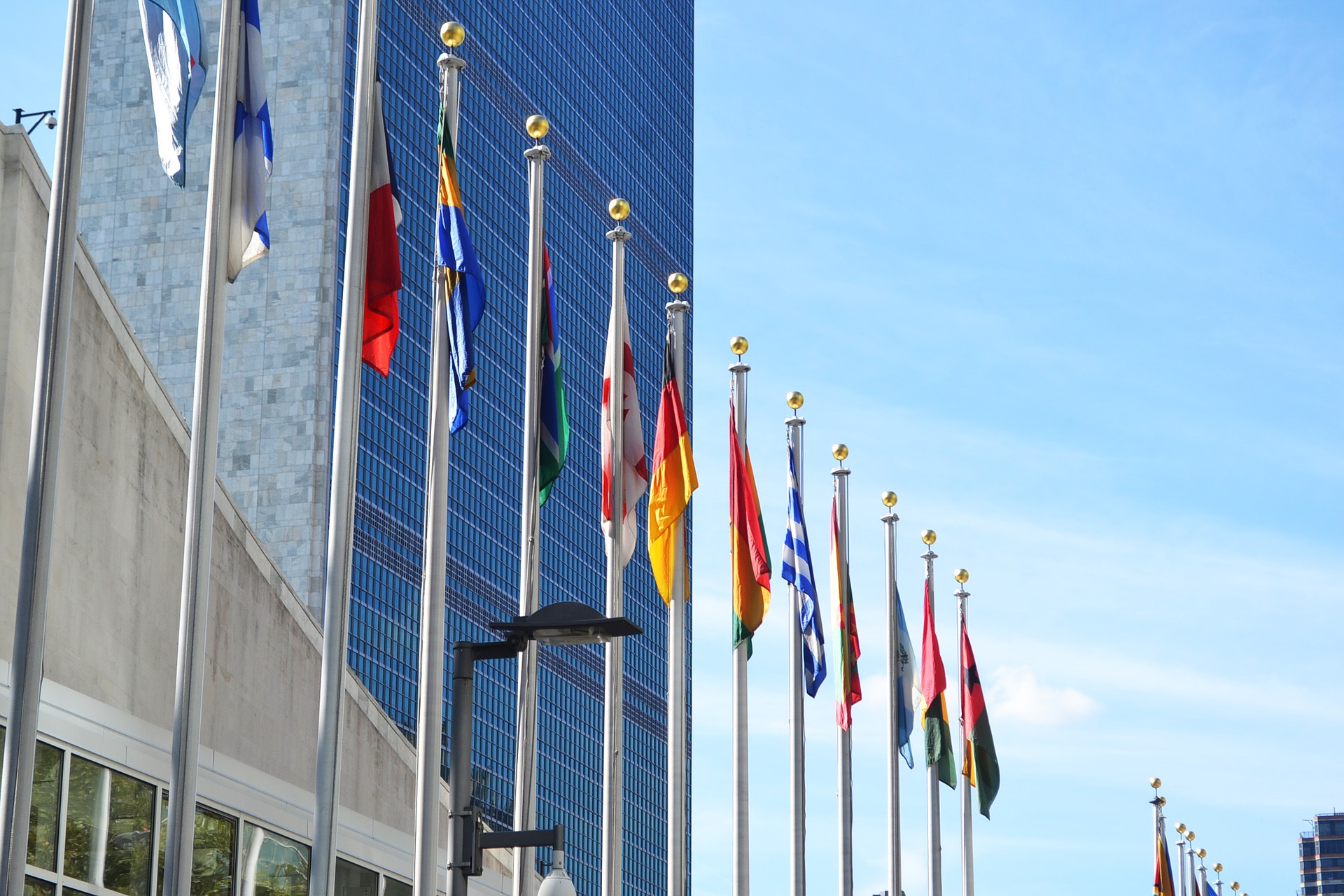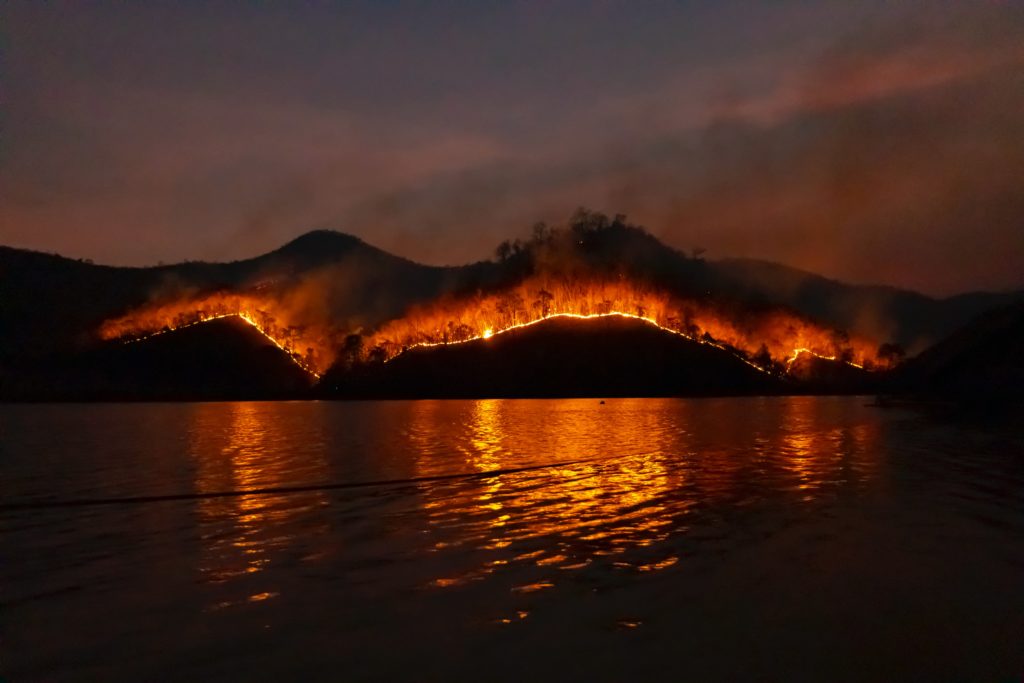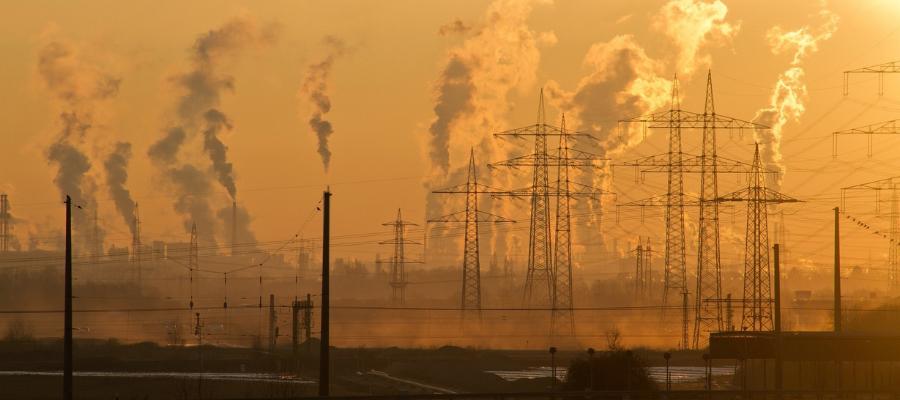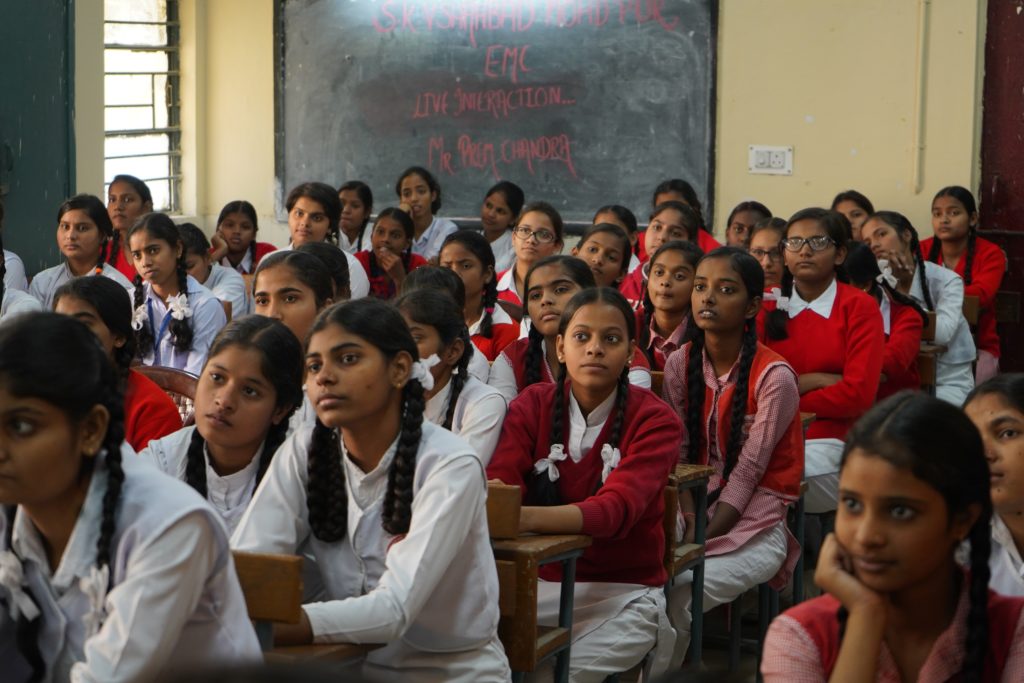
Global NDCs Get Failing Grade On Climate Literacy Ambitions and Gender Education Commitments
Section 1: Introduction
Today’s climate crisis demands a bold response. In order to act, to make the best choices in their daily lives, and to catalyze the urgent change needed, people everywhere need to be properly educated: that starts in school.
EARTHDAY.ORG believes every school in the world must have compulsory, assessed climate and environmental education with a strong civic engagement component. It is imperative that gender equality also be embedded in climate and environmental education, empowering women and girls to tackle the climate crisis.
The Paris Agreement, with the goal of keeping the global average temperature at least 2℃ below pre-industrial levels, was signed into agreement on Earth Day in 2016. Included in Article 12 of the Paris Agreement is Action for Climate Empowerment (ACE), with the goal to “empower all members of society to engage in climate action, through education, training, public awareness, public participation, public access to information, and international cooperation on these issues.”
Nationally Determined Contributions (NDCs) to the Paris Agreement outline exact steps for how a country will reduce its greenhouse gas emissions and build resilience to adapt to challenges already present from climate change. Through their NDCs, countries have an opportunity to include climate education as a vital action on climate change.
This study reviews all countries’ (165) NDCs for the prevalence and depth of inclusion of climate literacy and gender key terms. The findings conclude that 0 countries have thoroughly addressed climate literacy within their NDCs. The failure of every country to make strong commitments to climate education is inadequate to address climate change.
The study was last updated on August 5, 2021.
Section 2: Climate Literacy
Climate literacy refers to the ability to understand complex relationships of multiple variables of the climate system and act in the best interest of long-term global health. Individuals who are climate literate make informed and thoughtful decisions based on science, economic, and social factors to have the least impact on the climate system.
For an analysis of climate literacy, the terms “climate education,” “climate literacy,” “education,” and “curricula” were searched in each NDC. If an NDC includes one of these terms, the study contains a brief description of how climate education is mentioned.
2a. Key findings:
Out of 165 NDCs reviewed, none thoroughly address climate education and/or climate literacy. Every NDC fails to include adequate details about a strong plan for compulsory, assessed climate and environmental education with a strong civic engagement component.
29 NDCs moderately address climate education and/or climate literacy. These NDCs state intentions and limited actions for implementing climate education in the country’s education system. While these efforts are a starting point, none are enough to properly address the climate emergency. Of these countries, Cabo Verde, Indonesia, and Argentina are the only countries that specifically cite “climate literacy.”
32 NDCs poorly address climate education and/or climate literacy. These NDCs state intentions for climate education, but do not include any actions for implementing it in the country’s education system.
104 NDCs do not address climate education and/or climate literacy at all.
2b. Category Breakdown:
Category 1: Climate Literacy Thoroughly Addressed
No countries fit in this category.
Category 2: Climate Literacy Moderately Addressed
This category includes NDCs which state intentions and limited actions for how climate education will be implemented in the country’s education system. This includes, but is not limited to, specific laws or strategies related to climate education and/or climate literacy in K-12 schools and curriculum integration. The countries in this category are:
| Argentina | Colombia | Myanmar | United Kingdom of Great Britain and Northern Ireland |
| Andorra | Dominican Republic | Nepal | Uruguay |
| Angola | Eritrea | Republic of Moldova | Vanuatu |
| Brunei Darussalam | The Gambia | Rwanda | Viet Nam |
| Cambodia | Indonesia | Saint Lucia | Zambia |
| Cameroon | Lao People’s Democratic Republic | Seychelles | |
| Cabo Verde | North Macedonia | South Sudan | |
| Costa Rica | Malawi | St. Vincent and the Grenadines |
Country Examples:
● Argentina mentions education to promote climate awareness and the “bill on Comprehensive Environmental Education which seeks to incorporate the new paradigms of environmental sustainability into the fields of formal and non-formal education” (which is now approved and enforced as of May 2021). “The Argentine Republic conceives of environmental education in a comprehensive and transversal way, as a critical social practice, which aims to promote environmental and climate literacy, in pursuit of the formation of an environmentally sensitive and responsible citizenship in the exercise and defense of the right to a healthy and diverse environment that ensures sustainable development. In this sense, environmental education and the promotion of a culture with a climate perspective are aligned with the principles of intergenerational equity, human rights, interculturality and gender equality.” Environmental education is one of the 15 guiding axes that will guide the design, implementation, and monitoring of all national adaptation and mitigation actions. (Note: these quotes have been translated from their original form in Spanish).
● Cambodia states a priority to “integrate climate change into curricula for all levels of education.” It will “(mainstream) climate change into Education Strategic Plan 2019-2023 Strategic Plan and SDG4 Roadmap for Education 2030” and will “conduct training for education officials on climate change e.g. as a required component of teacher training.”
● Colombia mentions “formal education, education for work and human development and informal education, and other processes aimed at sensitizing the population about climate change.” It also “adds the areas of Planning, and Education, training and awareness, and adapts the set in accordance with the instrumental lines of the National Climate Change Policy.” (Note: these quotes have been translated from their original form in Spanish).
● Cabo Verde is “facilitat(ing) public access to climate information and includ(ing) climate education and ancient coping practices in textbooks and schools for all age groups by 2025 and train(ing) teaching staff accordingly.”
● According to the Dominican Republic’s NDC, “with the recently enacted Environmental Education and Communication Law, the Dominican Republic has proposed to promote formal climate education programs in all its modalities at different levels and through different institutions on climate action. This contemplates a change in the different levels, cycles, grades, modalities and stages of the Dominican school system and higher, in public educational centers and private; as well as, in a transversal and articulated way, in all forms of formal, non-formal and informal, in order to promote environmental awareness and awareness throughout Dominican society.” (Note: this quote has been translated from its original form in Spanish).
Category 3: Climate Literacy Poorly Addressed
This category includes NDCs which state intentions for climate education, but do not mention how it will be implemented in the country’s education system. This includes, but is not limited to, countries which reference the importance of climate education and/or climate literacy, but provide no further information on policy initiatives to support this. The countries in this category are:
| Algeria | Dominica | Marshall Islands | Sierra Leone |
| Belarus | El Salvador | Mauritius | Somalia |
| Burundi | Equatorial Guinea | Mongolia | South Africa |
| Canada | Georgia | Mozambique | Sri Lanka |
| Central African Republic | Guinea Bissau | Namibia | United Republic of Tanzania |
| Chad | Haiti | Panama | Thailand |
| Chile | Honduras | Paraguay | Uganda |
| Comoros | Kiribati | Philippines | Zimbabwe |
Category 4: Climate Literacy Not Addressed
| Afghanistan | Ethiopia | Mali | Saudi Arabia |
| Albania | European Union | Mauritania | Senegal |
| Antigua and Barbuda | Fiji | Mexico | Serbia |
| Armenia | Gabon | Micronesia | Singapore |
| Australia | Ghana | Monaco | Solomon Islands |
| Azerbaijan | Grenada | Montenegro | Sudan |
| Bahamas | Guatemala | Morocco | Suriname |
| Bahrain | Guinea | Nauru | Switzerland |
| Bangladesh | Guyana | New Zealand | Syrian Arab Republic |
| Barbados | Iceland | Nicaragua | Tajikistan |
| Belize | India | Niger | Timor Leste |
| Benin | Israel | Nigeria | Togo |
| Bhutan | Jamaica | Niue | Tonga |
| Bolivia | Japan | Norway | Trinidad and Tobago |
| Bosnia and Herzegovina | Jordan | Oman | Tunisia |
| Botswana | Kazakhstan | Pakistan | Turkmenistan |
| Brazil | Kenya | Palau | Tuvalu |
| Burkina Faso | Democratic People’s Republic of Korea | State of Palestine | Ukraine |
| China | Kuwait | Papua New Guinea | United Arab Emirates |
| Congo | Kyrgyzstan | Peru | United States of America |
| The Democratic Republic of Congo | Lebanon | Qatar | Uzbekistan |
| Cook Islands | Lesotho | Republic of Korea | Venezuela (Bolivarian Republic of) |
| Cote d’Ivoire | Liberia | Russian Federation | |
| Cuba | Liechtenstein | Saint Kitts and Nevis | |
| Djibouti | Madagascar | Samoa | |
| Egypt | Malaysia | San Marino |
2c. Action for Climate Empowerment (ACE) Analysis:
The terms “climate education,” “climate literacy,” “education,” and “curricula” were also searched in Action for Climate Empowerment (ACE) submissions for consideration at upcoming sessions. These submissions contain information on steps taken to implement the Doha work programme and in relation to ACE.
2d. Key Findings:
Out of 12 ACE submissions (representing 82 countries) for consideration at upcoming sessions, 7 submissions (representing 14 countries) include climate education and/or climate literacy.
7 countries include climate education and/or climate literacy in both their ACE submissions and NDCs. These countries are: Chile, Colombia, Costa Rica, Dominican Republic, Indonesia, North Macedonia, and Uruguay.
7 countries include climate education and/or literacy in just their ACE submissions but not in their NDCs. These countries are: Bosnia and Herzegovina, European Union, Mexico, Peru, Serbia, Sudan, and the United States of America.
Section 3: Gender
Gender equality is interconnected with climate literacy. In order to achieve universal, compulsory, and assessed climate and environmental education, there must be an emphasis on ensuring that young girls and women are included in this work at every level. As students, educators, household decision-makers, and citizens, girls and women have an extraordinary role to play in addressing the climate crisis. When considering climate education, it is also necessary to consider the long-standing systems of oppression that limit young girls’ access to educational opportunities.
For an analysis of gender, the term “gender” was searched in each NDC. Gender-responsive refers to a policy or program which takes gender norms, roles, and relations into consideration and reduces gender inequality.
3a. Key findings:
107 NDCs reference gender.
Of the above NDCs, only 7 make the connection between gender equality and climate education and/or climate literacy. 100 NDCs reference gender, but do not make a connection between gender equality and climate education and/or climate literacy. Much greater emphasis on this connection, as well as gender-responsive actions, are needed throughout the NDCs.
58 NDCs do not reference gender at all.
3b. Category Breakdown:
Category 1: Gender and Climate Literacy Addressed
This category includes NDCs which make a connection between gender and climate education and/or climate literacy. This category also includes NDCs which promote gender-responsive actions or policies involving climate education and/or climate literacy. The countries in this category are:
| Argentina | Dominican Republic | Republic of Moldova |
| Cambodia | Kiribati | |
| Colombia | Nepal |
Country examples:
● Argentina mentions gender over 150 times and made its own section in the NDC. “The Argentine Republic conceives of environmental education in a comprehensive and transversal way, as a critical social practice, which aims to promote environmental and climate literacy, in pursuit of the formation of an environmentally sensitive and responsible citizenship in the exercise and defense of the right to a healthy and diverse environment that ensures sustainable development. In this sense, Environmental education and the promotion of a culture with a climate perspective are aligned with the principles of intergenerational equity, human rights, interculturality and gender equality.” (Note: this quote has been translated from its original form in Spanish).
● Colombia will, by 2030, “update the National Environmental Education Policy to re-signify it and show in it the importance and urgency of the approach in all levels of climate change education, according to the national, regional and local context, from human rights approaches, intergenerational, differential and gender.” (Note: this quote has been translated from its original form in Spanish).
● The Dominican Republic’s “National Adaptation Plan for Climate Change in the Dominican Republic 2015-2030… has seven lines transversal strategies:… information and education and integration of the gender perspective.” (Note: this quote has been translated from its original form in Spanish).
● Republic of Moldova mentions “climate considerations integrated in sectoral education curricula, taking into consideration gender aspects.”
Category 2: Gender Addressed Without Climate Literacy Connection
This category includes NDCs which mention gender, but neither make a connection between gender and climate education and/or climate literacy, nor promote gender-responsive actions on climate education and/or climate literacy. The countries in this category are:
| Angola | Grenada | Namibia | Sri Lanka |
| Armenia | Guatemala | Nauru | Sudan |
| Barbados | Guinea | Nepal | Suriname |
| Benin | Haiti | Nicaragua | St. Vincent and the Grenadines |
| Bhutan | Honduras | Niger | Switzerland |
| Brazil | Iceland | Nigeria | Tajikistan |
| Brunei Darussalam | India | Norway | United Republic of Tanzania |
| Burkina Faso | Indonesia | State of Palestine | Thailand |
| Burundi | Israel | Panama | Tonga |
| Cameroon | Jamaica | Papua New Guinea | Uganda |
| Canada | Jordan | Paraguay | Ukraine |
| Cabo Verde | Kenya | Peru | United Kingdom of Great Britain and Northern Ireland |
| Chad | Lao People’s Democratic Republic | Philippines | United States of America |
| Chile | Lebanon | Republic of Korea | Uruguay |
| Congo | Lesotho | Russian Federation | Uzbekistan |
| Costa Rica | Liberia | Rwanda | Vanuatu |
| Cote d’Ivoire | North Macedonia | Saint Lucia | Venezuela (Bolivarian Republic of) |
| Dominica | Malawi | Samoa | Viet Nam |
| Ecuador | Malaysia | Sao Tome and Principe | Zambia |
| Eritrea | Maldives | Senegal | Zimbabwe |
| Eswatini | Mali | Seychelles | |
| Ethiopia | Marshall Islands | Sierra Leone | |
| European Union | Mauritius | Singapore | |
| Fiji | Mexico | Solomon Islands | |
| Gambia | Montenegro | Somalia | |
| Georgia | Morocco | South Africa | |
| Ghana | Myanmar | South Sudan |
Category 3: Gender Not Addressed
| Afghanistan | Central African Republic | Democratic People’s Republic of Korea | Qatar |
| Albania | China | Kuwait | Saint Kitts and Nevis |
| Algeria | The Democratic Republic of Congo | Kyrgyzstan | San Marino |
| Andorra | Cook Islands | Liechtenstein | Saudi Arabia |
| Antigua and Barbuda | Comoros | Madagascar | Serbia |
| Australia | Cuba | Mauritania | Syrian Arabic Republic |
| Azerbaijan | Djibouti | Micronesia | Timor Leste |
| Bahamas | Egypt | Monaco | Togo |
| Bahrain | El Salvador | Mongolia | Trinidad and Tobago |
| Bangladesh | Equatorial Guinea | Mozambique | Tunisia |
| Belarus | Gabon | New Zealand | Turkmenistan |
| Belize | Guinea Bissau | Niue | Tuvalu |
| Bolivia | Guyana | Oman | United Arab Emirates |
| Bosnia and Herzegovina | Japan | Pakistan | |
| Botswana | Kazakhstan | Palau |
Section 4: Conclusion
The analysis of climate literacy key terms makes clear the failure for countries to thoroughly address this topic within their NDCs. Although 29 NDCs provide some information about how climate education will be implemented in the country’s education system, they miss the mark to commit to compulsory, assessed climate and environmental education with a strong civic engagement component. Therefore, none of the NDCs promote an education that is ambitious enough to address the climate emergency.
Although there are 7 more countries that include climate education and/or climate literacy in their ACE submissions, the information in these submissions must be integrated within these countries’ NDCs in order to enhance progress in this area. Further work must also be done to reduce gaps in climate education during the implementation of ACE.
Furthermore, only 7 NDCs mention the connection between gender equality and climate education and/or literacy. As women and girls have indispensable and unique roles in addressing the climate crisis, gender equality must be tied to climate education at every stage of development and implementation — including within the NDCs.
The next Conference of Parties (COP26) is scheduled for November of 2021 in Glasgow, Scotland. In this international meeting of heads of state and governments and stakeholders, countries will have an opportunity to heighten their ambition on climate literacy.
This study was conducted by EARTHDAY.ORG’s Education and Communication Manager, Rachel Weisbrot. Rodolfo Beltran, Ellie Cowan, Kate Crowell, Michelle Drandell, Zazi Halla, and Juliana Schmidt also greatly contributed to this study with their research.










